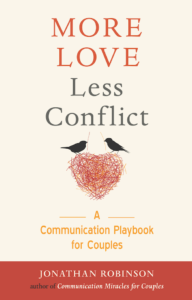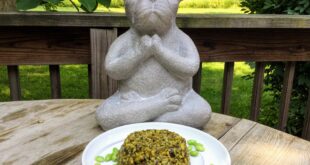By Janae Jean and Spencer Schluter —

For this interview, we had the honor to speak with psychotherapist, best-selling author, speaker and podcaster, Jonathan Robinson. Jonathan’s books have been translated into 47 languages, and he has reached over 250 million people worldwide with his practical methods. He has made numerous appearances on Oprah and CNN, as well as other national television shows.
To connect with Jonathan, visit his website and blog at www.findinghappines.com to get more information about his books, articles, speaking engagements and more.
The following is only a snippet conversation with Jonathan. We spoke to him more about the power of communication and healing in today’s divided world. To hear the entire interview and hear previous podcasts, go to www.ConsciousCommunityMagazine.com. Don’t forget to subscribe, like, review and share the Conscious Community Podcast on your preferred podcatcher app.
Janae: Your background is as a psychotherapist. How does that relate to your work with couples?
JR: I became a psychotherapist very young, partly to heal myself. I was blessed to grow up in a totally dysfunctional family. When I was a teenager I was depressed and suicidal, so I was looking to see how to help my own situation. I read self-help books, got into psychotherapy and became a psychotherapist. I was a lousy psychotherapist. So, instead of doing that I started to write books. I wrote books in the genre called “books that Oprah likes.” If you’re going to be a writer, I recommend that genre! [Laughs.] For my first few books, I got on Oprah. Then I was speaking to large groups.
One thing that always interested me is that people experience a lot of difficulty in their relationship. So, it’s a good place to intervene with people because they feel the difficulty there. If you can give them simple thing that helps them get to a place of love quickly, they become hooked on self-help. They become hooked on personal transformation. So, that’s where I put my energy.
Spencer: Can you tell us a little bit about this book, More Love, Less Conflict? What were you trying to accomplish with it?
JR: Something I’ve noticed is that the quality of our life is very much based on the quality of our relationships. In real estate, they say what’s important is “Location, location, location!” In happiness research, they have a similar thing where they say what is important is “Relationships, relationships, relationships!” Most people may think they are good communicators, but they really are not so good. Therefore, they have a hard time working through problems; they have a hard time having happy relationships; they have a hard time creating love wherever they go. I saw that if you can improve somebody’s communication skills, which you can really do quite dramatically in an hour, their entire life transforms. Most people were simply unaware of these simple techniques that can really make their communication a lot better. So, I decided to steal all the best communication techniques from all the people I had talked to—whether It be Oprah, the Dalai Lama or whoever—and put them all in one book. So, the book is these really simple methods that take less than 20-seconds to do that will immediately help to resolve conflict or get to a place of more connection, rapport or love with people that you care about.
 JJ: In your book, you talk about the “four horsemen of the apocalypse of relationships.” Can you tell us about those?
JJ: In your book, you talk about the “four horsemen of the apocalypse of relationships.” Can you tell us about those?
JR: When things are going poorly, people always resort to these four things. I call them “The Four D’s.” One is denigration, which is really blame. When we’re upset with someone, we always blame them and blame never works. I’ve never had a time when I blamed my wife and told her what she was doing wrong where her response was “Oh my gosh! You’re right! Now I see what you’re talking about. I’ll have to change that.” That never happens. Blame never works. So that’s one of the horsemen of the apocalypse. Another one is distraction. We all have these WMDs—not Weapons of Mass Destruction, but Widgets of Mass Distraction. People are always relying on these things for communication, but actually texting, smartphones and email are actually very superficial forms of communication. I think what people want is deep communication. Another “D” is denial. That doesn’t help. When you have a problem in a relationship, hoping it goes away doesn’t do anything. The last one is dismissal, meaning you don’t take what your partner says seriously, especially their feelings. I hear it all the time. “Oh, you’re making a big deal out of this.” “It’s not that big of a deal.” “You shouldn’t feel that way.” All of those are just dismissing people and nobody likes being dismissed.
JJ: Do you have any recommendations for how communication can be used in this very polarized world right now? How can we start a dialog between diverse worldviews?
JR: It’s a great question because our nation is obviously very polarized. One in three couples actually belong to different political parties. So, they have this issue in their marriage. What I find is important is to understand people. If you show people that you understand them and you have empathy for their point of view, they will then be able to listen to you. But, they won’t be able to listen to you until they feel really “gotten.”
JJ: One of the things in your book that I thought was really beautiful was this mantra that you went to India to find out what it was. Would you tell us that story?
JR: One of the things I saw in people who were expert communicators—and really happy couples—was that they have a feeling of gratitude to each other. Your partner gets whether you take them for granted or whether you feel grateful for them. So, a friend of mine came back from India, and he said that he’d learned this special mantra for helping him feel incredible gratitude for his wife. So, I asked him if he would tell me what that mantra was, and he said, “No, you’re going to have to go to India and get it directly from the guru.”
So, I go all the way to India, and it’s a long, hard slog through India. I finally get to this ashram and finally get a chance to talk to this guru. I say, “Can you please give me this mantra to help me feel gratitude for the people I love.” He says to me in an India accent, “My mantra is the most powerful mantra on Earth!” He gets ready to whisper in my ear, and I’m very excited. I’m holding my breath. I don’t want to miss a word. He says, “Whenever possible repeat the following words: The mantra I give you are the words ‘Thank you’.” So, I look at him, “That’s it! I traveled 20,000 miles and to get ‘Thank you,’ that’s it!” He says, “No, ‘That’s it’ is the mantra you have been using and the makes the people you love feel like they’re never enough. My mantra is ‘Thank you’. ‘That’s it’ will take you nowhere.” So, I was pissed off and I give him a snide, “Well, thank you.” And, he looks at me and says, “’Thank you’ is not the mantra. You must say it from your heart many times per day. Every time you see your partner, child or pet, say ‘Thank you,’ and soon you will feel overwhelming gratitude.” And, it actually does work!
Janae Jean serves as editor, social media manager, recipe columnist and podcaster for Conscious Community Magazine. She has an extensive background in new media and music education. She is also the founder of Perennial Music and Arts, an arts education and healing center based in downtown Geneva, IL. Visit www.janaejean.com and www.perennialmusicandarts.com for details about Janae’s upcoming classes, lesson information, workshops, shows, articles and projects.
Spencer Schluter is the advertising account manager, social media manager and podcaster for Conscious Community Magazine. His experience includes visual communications, advertising, social media, marketing, public relations and business development. Visit www.yggstudios.com for more information about his freelance design and consulting work. He is also a master level Reiki and traditional Chinese Qigong practitioner.
Podcast: Play in new window | Download
Subscribe: RSS
 Conscious Community Magazine Dedicated to Elevating Consciousness
Conscious Community Magazine Dedicated to Elevating Consciousness





